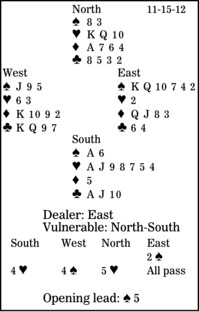Bridge column, November 15: The cards lie badly, but you can succeed

A bridge declarer typically has high-card power, but sometimes must overcome adversity -- a bad distribution of the key opposing cards. In this example, taken from a matchpointed duplicate, how should South plan the play in five hearts after West leads the spade five and East puts up his queen?
After East had opened with a weak two-bid, South's jump overcall showed a good hand with an expectation of making game opposite six or seven points and a modicum of fit. (You do not pre-empt against a pre-empt.) When West sacrificed in four spades, North was sure that his side could defeat four spades doubled (they would have gotten 300), but guessing that that would not be enough to compensate for a vulnerable game bonus, he raised to five hearts.
At first glance, South needs East to have at least one club honor. But whenever you have this holding (or A-Q-10 or A-Q-9), think elimination and endplay.
South takes the first trick with his spade ace, plays a diamond to dummy's ace, ruffs a diamond high, and returns to dummy with a trump. If hearts break 3-0, declarer takes two club finesses. Here, though, he ruffs another diamond high, crosses to dummy with a heart (drawing West's remaining trump), and ruffs the last diamond.
Then declarer leads his last spade. East will probably take the trick and shift to the club six, but South finesses. West wins but is endplayed. He must either return a club into declarer's tenace or lead his last spade, which South ruffs in the dummy and sluffs a club from his hand.
** ** **
COPYRIGHT: 2012, UNITED FEATURE SYNDICATE
DISTRIBUTED BY UNIVERSAL UCLICK FOR UFS

